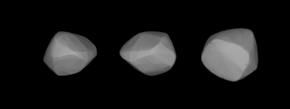386 Siegena
Appearance
 A three-dimensional model of 386 Siegena based on its light curve | |
| Discovery | |
|---|---|
| Discovered by | Max Wolf |
| Discovery date | 1 March 1894 |
| Designations | |
| (386) Siegena | |
| Pronunciation | /ˈsiːɡənə/ SEE-gə-nə[1] |
Named after | Siegen |
| 1894 AY | |
| Main belt | |
| Adjectives | Siegenian /siːˈɡɛniən/ see-GHEN-ee-ən[2] |
| Orbital characteristics[3] | |
| Epoch 31 July 2016 (JD 2457600.5) | |
| Uncertainty parameter 0 | |
| Observation arc | 122.08 yr (44590 d) |
| Aphelion | 3.38983 AU (507.111 Gm) |
| Perihelion | 2.40159 AU (359.273 Gm) |
| 2.89571 AU (433.192 Gm) | |
| Eccentricity | 0.17064 |
| 4.93 yr (1799.8 d) | |
| 66.7510° | |
| 0° 12m 0.068s / day | |
| Inclination | 20.2568° |
| 166.886° | |
| 219.478° | |
| Physical characteristics | |
| Dimensions | 165.01±2.7 km[3] 170.35 ± 8.40 km[4] |
| Mass | (8.14 ± 1.58) × 1018 kg[4] |
Mean density | 3.14 ± 0.76 g/cm3[4] |
| 9.763 h (0.4068 d) | |
| 0.0692±0.002 | |
| C | |
| 7.43 | |
386 Siegena is a very large main-belt asteroid. It is classified as a C-type asteroid and is probably composed of primitive carbonaceous material.
It was discovered by Max Wolf on March 1, 1894, in Heidelberg.
During 1999, the asteroid was observed occulting a star. The resulting chords provided a diameter estimate of 174 km.[5]
References
[edit]- ^ per "siegenite". Oxford English Dictionary (Online ed.). Oxford University Press. (Subscription or participating institution membership required.)
- ^ "Siegenian". Oxford English Dictionary (Online ed.). Oxford University Press. (Subscription or participating institution membership required.)
- ^ a b "386 Siegena (1894 AY)". JPL Small-Body Database. NASA/Jet Propulsion Laboratory. Retrieved 10 May 2016.
- ^ a b c Carry, B. (December 2012), "Density of asteroids", Planetary and Space Science, vol. 73, pp. 98–118, arXiv:1203.4336, Bibcode:2012P&SS...73...98C, doi:10.1016/j.pss.2012.03.009. See Table 1.
- ^ Shevchenko, Vasilij G.; Tedesco, Edward F. (September 2006), "Asteroid albedos deduced from stellar occultations", Icarus, 184 (1): 211–220, Bibcode:2006Icar..184..211S, doi:10.1016/j.icarus.2006.04.006.
External links
[edit]- 386 Siegena at AstDyS-2, Asteroids—Dynamic Site
- 386 Siegena at the JPL Small-Body Database
